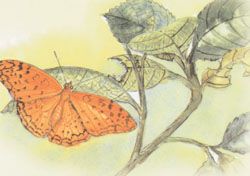|
The Butterflies
of Sri Lanka The function of an adult butterfly is to mate and reproduce. The body of an adult butterfly is divided into three distinctive parts, head, thorax and abdomen. There are two pairs of wings, which are membranous and supported by veins. The wings bear diverse patterns covered with scales and are useful in the identification of different butterfly species. The larger butterflies
may have a life span, of 15 to 20 days and the smaller less than
that. Butterflies
can feed only on liquid diets. They feed on decaying fruits and
vegetable matter, sap from trees, mammal and bird droppings and
dead animals. Female butterflies are very good botanists. Their
identification of plants is based on both visual clues as well as
chemical clues. The most common
natural enemies of butterflies are lizards, birds, spiders and predatory
insects. The butterfly
is one of the important components of the food chain of bird, reptiles,
spiders and predatory insects. They are also
good indicators of environmental changes as they are sensitive and
are directly affected by changes in natural habitats, atmospheric
temperature and weather conditions. Their life history being very
short, butterflies are a good subject for the study of genetics. They are the
most beautiful and colorful creatures on the earth. |
||||
Copyright © 2001 Wijeya Newspapers
Ltd. All rights reserved. |
